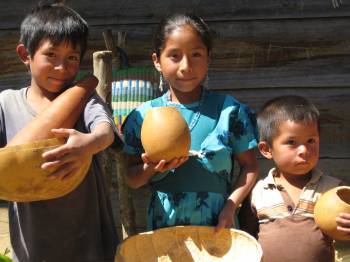Back to basics: Food sovereignty in local food systems, by OEH Intern Carmen Wadleigh
Health promoters in a demonstration garden.
A Tseltal family working in their garden.
As an environmental studies major, I read about the widespread discussion around the lack of food security in cities, mostly affecting low income and communities of color. Often after municipal officials and others make an external examinations of “at risk” neighborhoods, they suggest farmers markets or pea patches to solve the neighborhoods’ problem of poor access to a consistent supply of nutritional food. While these can be effective measures to increase access to food for marginalized groups, it is important for us to think more deeply about this issue so our solutions get to the root of the problem. In my opinion, we should be thinking about how food justice impacts people who live in the intersection of many identities—poor, people of color, urban, English as a second language speakers, etc. We need to think about increasing not only food security, but also food sovereignty.
While it is easy to get lost in the heady language of a liberal arts classroom, defining and analyzing the differences between food security and food sovereignty have important real-life applications. Food security refers to people having physical, social and economic access to enough nutritious food to meet their health needs. Food sovereignty, on the other hand, goes further to encompass the rights of communities, rather than corporations and market institutions, to control the mechanisms and policies of food production and distribution in ways that are ecologically, socially, economically, and culturally appropriate for their communities.
Food sovereignty plays an important role for immigrant communities, as cuisine is an essential part of cultural identity. Communities are often strengthened when they grow and prepare food together. This differs from the narrower vision of food security, which does not necessarily take into account community identity or cultural preferences, but simply defines success as providing access to calories in whatever form, as long as they meet nutritional needs.
Food policies and programs that work to engage fully with the folks they serve may empower individuals and improve civil engagement on a larger scale. When communities are in charge of cultivating, harvesting and preparing the food they eat, they can feel a greater sense of pride in their food systems and cultures. If the programs are well implemented and serve the needs of the community, people will feel a greater sense of internal responsibility that can improve the viability of food systems in the long run.
Projects that seek to build food sovereignty can vary depending on the conditions of the community. One Equal Heart’s Together We Grow Stronger Programs incorporates Tseltal families and community leaders in the local food system. Families learn to grow more food, and more nutritious food, free of chemical pesticides, by employing ecological farming strategies. They organize local markets to sell and exchange the food they produce, and learn to manage the money for savings or to finance small businesses through savings and credit cooperatives. One Equal Heart’s interview of participants in the Together We Grow Stronger shows how the program increases the capacities of individual families while strengthening communities in significant ways:
1. Better nutrition:
My life is delicious! Even in a very small place, I can grow all sorts of vegetables right in my backyard: radishes, cabbage, cilantro, and green onions–lots of things! My family eats better now. I don’t go to the store to buy food anymore; it’s right outside my door. Anamaría Pérez
2. Greater access to schooling and medicines:
With the savings and credit cooperative, our lives improve. Without these funds, our children wouldn’t be able to go to secondary school. With the cooperative, we can share our children’s dream to continue their education. Yolanda López
I like being able to borrow money from the cooperative when one of my kids gets sick…I feel more secureknowing that if something happens, I can turn to the cooperative for help. Petrona Jimenez
3. Increased economic opportunities:
My wife and I decided to stop buying food. Now we grow most of our food. And we have enough to sell some of what we grow and earn money. We also barter, exchanging different kinds of beans or corn. Belisario Aguilar
As a group, we are thinking about how to invest the interest money we have earned through our cooperative. One of our dreams is to be able to fund the costs of building a house, which would be a great benefit for some families in our village. Alonso Jimenez
4. Stronger communities:
Now that we are meeting, we see each other as sisters, not just neighbors. We are happier as a group. We are working on making our savings and credit cooperative stronger. We are more united. There is more harmony among us as a community. Yolanda López
We don’t have to travel all the way to Chiapas to learn about another program that works to strengthen food sovereignty. Closer to home is the Danny Woo Community Garden located in the International District. It was created in 1975 in response to frustrations felt by the Asian American community residing in the area. Elders expressed a desire for a community space to grow fruits and vegetables, and with countless hours of volunteer work and organizing, the garden became a reality. It has proven to be invaluable for cultural and community connection as well as improving food access. For many elderly Asian American immigrants in the area who come from agrarian backgrounds, gardening allows a return to this cultural practice. Additionally, the garden provides a crucial platform for community socializing, strengthening relationships and fostering increased trust—a rich harvest by anyone’s measure!



